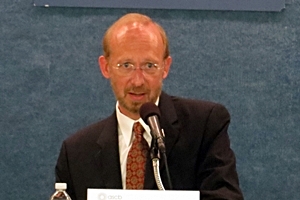
UC-San Diego’s Don Cleveland, ASCB president, called basic research “a spectacular investment.” (A. Kotok)
The government shut-down, said a group of researchers, is taking a large and lasting toll on life sciences in the U.S., with the ripples being felt in the economy at large. The life scientists spoke today at a press conference in Washington, D.C. organized by American Society for Cell Biology (ASCB).
The researchers, all from university labs, told about the effects of the government shut-down, particularly at National Institutes of Health that funds the bulk of life science and biomedical research in the U.S. They, along with officials with ASCB, said the shut-down is only the latest of body blows inflicted on science funding, following this year’s budget sequestration that cut NIH’s funding by 5.5 percent, on top of a continued tightening of NIH research funds over the past 10 years.
Kevin Wilson, public policy director at ASCB, described the immediate effects of the shut-down on U.S. research agencies. Some 73 percent of NIH staff are on furlough, with all internal studies stopped and remaining staff doing tasks like feeding lab animals and maintaining equipment.
The agency is starting no new clinical trials, and no new patients are being enrolled in trials currently underway. In addition, says Wilson, the peer review system of grant applications at NIH and National Science Foundation has stopped, putting researchers who applied for grant support in limbo, and with no new grant applications being accepted.
Carol Greider, a professor of genetics and molecular biology at Johns Hopkins University — and co-recipient of the 2009 Nobel prize in medicine — said the shut-down forced her lab to suspend some of its work, which was already suffering from the sequestration. Because of sequestration, grants in her department were cut 5 to 20 percent, with other researchers facing delays in funding as long as six months, all leading to staff layoffs.
Rebecca Burdine, a professor of molecular biology at Princeton University, called NIH “a sinking ship” resulting from a decade of shrinking budgets, the 2013 sequestration, and now the shut-down. The cumulative effect of this environment, says Burdine, is convincing promising graduate students to find careers in fields other than science.
Don Cleveland, professor of medicine and neuroscience at University of California in San Diego and current president of ASCB, described how many research labs resemble small businesses, where lab directors need to have entrepreneurial skills, including the ability to continuously raise capital. Research labs normally have few financial reserves, said Cleveland, and now many lab directors are struggling just to hold their groups together.
Speakers told how the shut-down and earlier sequestration could have negative impacts on business and take a bite out of the economy at large. Cleveland called research funding “a spectacular investment,” and “the way to build and sustain an economy.” Greider noted fewer discoveries in research labs from diminishing support for basic research lead to fewer spin-off companies from those labs that create jobs in their local communities. “A generation of innovators may be lost,” Greider said.
As the shut-down continues and budget cuts become permanent, the effects on life science research in the U.S. are becoming more dire, said ASCB executive director Stefano Bertuzzi. He told how some labs were able to ride out the 2013 sequestration by squeezing out funds from savings held in reserve. But those reserves are now gone, said Bertuzzi, and continued cuts would be much larger in 2014, having “an exponential effect” on basic research in the U.S.
Read more:
- Who’s a Patent Troll? You’ll be Surprised by the Answer
- Mayo CEO: Government Needs to Fund Health Care Innovation
- Special: U.S. Policies Connect Research to Manufacturing
* * *

 RSS - Posts
RSS - Posts
You must be logged in to post a comment.